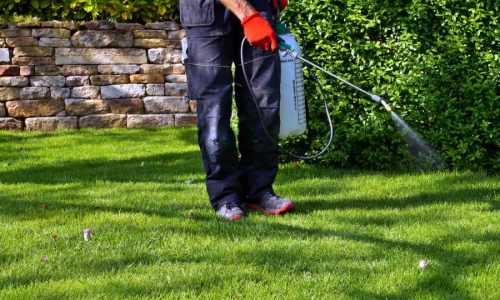Weed Killer and Non-Hodgkin Lymphoma
Non-Hodgkin lymphoma is a cancer that affects the immune system. Some research indicates that exposure to glyphosate, a common ingredient in weed killers, may be linked to non-Hodgkin lymphoma, or NHL. Other research has not established a clear connection between glyphosate and NHL. Serving patients throughout New Jersey, Connecticut, Maryland, and the Washington, D.C., area, Regional Cancer Care Associates (RCCA) stays abreast of the latest research in cancer risk factors. Learn more about glyphosate and cancer risk.

What Is Glyphosate?
Glyphosate is a broad-spectrum herbicide used to kill weeds. As the most common herbicide in the United States and throughout the world, glyphosate is used by farmers, gardeners, landscapers, and homeowners. There are more than 750 products sold in the United States alone that contain glyphosate, but the most well-known product is probably Roundup, a weed killer manufactured by Monsanto. A University of Washington glyphosate study found that exposure to glyphosate increases the risk of non-Hodgkin lymphoma by up to 41%.
Evolving Research Into Glyphosate and Cancer
Another recent glyphosate study, conducted by the National Institutes of Health (NIH) and the Centers for Disease Control and Prevention (CDC), found a strong link between glyphosate exposure and oxidative stress markers in humans. Long-term oxidative stress, which occurs when the body doesn’t have enough antioxidants, is associated with cancer and other diseases. The study looked at urine samples from more than 2,310 Americans and found that more than 80% of the samples contained glyphosate. At the same time, it is important to note that after conducting a review, the U.S. Environmental Protection Agency said last year that “there are no risks of concern to human health when glyphosate is used” as directed. The agency added, “glyphosate is unlikely to be a human carcinogen.”
What Is Non-Hodgkin Lymphoma?
Non-Hodgkin lymphoma is a group of cancers that typically develop in the lymphatic system. There are more than 70 different types of non-Hodgkin lymphoma. These cancers occur when the body produces too many leukocytes, a kind of white blood cell. Non-Hodgkin lymphoma is classified based on the type of cell it first developed in. There are three major groups:
- B-cell lymphoma
- T-cell lymphoma
- NK-cell lymphoma
B-cell lymphoma is the most common of the three. Overall, non-Hodgkin lymphoma is one of the most common cancers, accounting for 4% of all cancers in the U.S.
Risk Factors for Non-Hodgkin Lymphoma
Certain factors are known to increase a person’s risk of developing non-Hodgkin lymphoma. These include:
- Sex: Rates of non-Hodgkin lymphoma are higher among men than women.
- Age: The risk of non-Hodgkin lymphoma increases with age.
- Medical history: Some types of non-Hodgkin lymphoma are associated with certain viruses and bacterial infections, such as the Epstein-Barr virus.
- Organ transplantation: Recipients of organ transplants have an elevated risk of non-Hodgkin lymphoma.
- Autoimmune disorders: People who have autoimmune diseases such as rheumatoid arthritis are more likely to develop non-Hodgkin lymphoma.
Weed Killers: Types, Usage, and Chemicals
Weed killer is a generic term for any type of solution that is applied to farmland, gardens, or lawns to eliminate weeds. Common types of weed killers include herbicides, pesticides, and fungicides. Herbicides can be selective – meaning they target a specific kind of plant – or nonselective, meaning they can kill any green plant to which they’re applied. Glyphosate is a nonselective herbicide.
In addition to glyphosate, weed killers contain other ingredients that pose potential health risks:
- 2,4-Dichlorophenoxyacetic acid: Known as 2,4-D, this is a chemical compound found in Agent Orange. 2,4-D can cause eye and skin irritation.
- Paraquat: This organic compound is a common herbicide. Ingestion of even a small amount can be fatal, and repeated exposure is linked to lung problems.
- Atrazine: Found in more than 300 products, atrazine is not currently classified as a carcinogen, but long-term exposure is linked to a higher risk of kidney failure.
Assessing the Health Risks and Protecting Yourself
If you are regularly exposed to weed killers containing glyphosate, there are steps you can take to protect yourself. Always wear the proper protective gear when applying herbicides. Store and dispose of herbicides properly to keep chemicals out of waterways. And consider alternatives to chemical-based weed killers, such as organic weed control methods or mechanical weeding.
Trust the Cancer Specialists at RCCA
While prolonged exposure to glyphosate may increase the risk of non-Hodgkin lymphoma, this cancer is very treatable if caught early. With more than 20 locations across New Jersey, Connecticut, Maryland, and the Washington, D.C., area, people can find treatment close to home at Regional Cancer Care Associates. We treat all cancer types, including non-Hodgkin lymphoma, as well as blood disorders. Our board-certified medical oncologists have extensive experience in providing cutting-edge cancer treatments, including immunotherapy, radiation therapy, and chemotherapy. For more information about cancer care at RCCA, contact us today.
we are here for you
For more information or to schedule an appointment,
call 844-346-7222. You can also schedule an appointment by calling the RCCA location nearest you.
RELATED ARTICLES

Regional Cancer Care Associates is one of fewer than 200 medical practices in the country selected to participate in the Oncology Care Model (OCM); a recent Medicare initiative aimed at improving care coordination and access to and quality of care for Medicare beneficiaries undergoing chemotherapy treatment.





